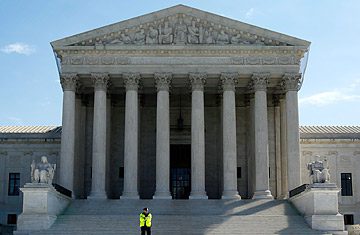
A police officer stands in front of the Supreme Court on April 9, 2010
(2 of 2)
How did the honest-services law ever get on the books?
There's a funny history here. In the early 1980s, federal prosecutors started to get federal jurisdiction over bribery cases involving public officials at the state level. So they came up with this theory: well, this is a fraud case, and fraud has to be a kind of theft. These public officials did kind of steal something — their constituents' right to honest government. That's the so-called intangible rights theory.
But in 1987, the Supreme Court said, No, fraud really has to be about property, not this intangible stuff. Congress didn't like this ruling. So they relegislated the section at issue in 1988 — but they overdid it with this ridiculous statute saying honest services could be the predicate for mail or wire fraud.
Prosecutors said, Oh my God, we've died and gone to heaven. We can prosecute anything under this! For instance, if you use your TIME office phone or computer to talk to your relatives, well, look what you've done. Your employer was entitled, by virtue of your employment contract, to your honest services. Hmm, you kind of violated those duties. You could be prosecuted for a federal crime. I've spoken to prosecutors over the years who said, This is a great law, we don't have to rely on these technicalities that tell you what a crime is, we can use our own good judgment about when someone is sleazy enough to be a federal criminal. This is not reassuring.
Might Congress try to legislate around Thursday's Supreme Court's ruling?
There's a line and a footnote in the opinion that shows how hard it would be to do anything about it. Essentially what it says is, it's hard to define a dishonesty fraud, other than bribery. Abusing your position in order to benefit yourself, in all the ways people can do that, that's pretty hard to write a law about.
So what happens to Skilling now?
There was another issue [before the Supreme Court]: [Skilling] said he had an unfair trial because of prejudicial publicity, but [the court] said, Oh, please. So now it goes back to the lower courts to determine whether the broad conspiracy charge and some other security-fraud charges he was convicted of still stand. Skilling is likely to win on nullification of the conspiracy charge, but it's less clear whether the other security charges which he argues got confused in the jury's mind with the honest-services issue will still stand. So he may stay in jail.
So what's the takeaway from this decision?
I think this is a modest blow to federal prosecutors, but it's a blow they deserved. The ability to punish outright security fraud and in particular insider trading, that's alive and well.
In the political area, I think it will force the states to be a little more aggressive with local and state officials; they shouldn't always count on the feds to do it.
